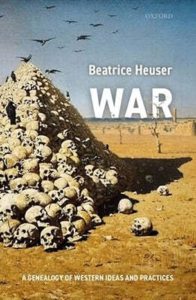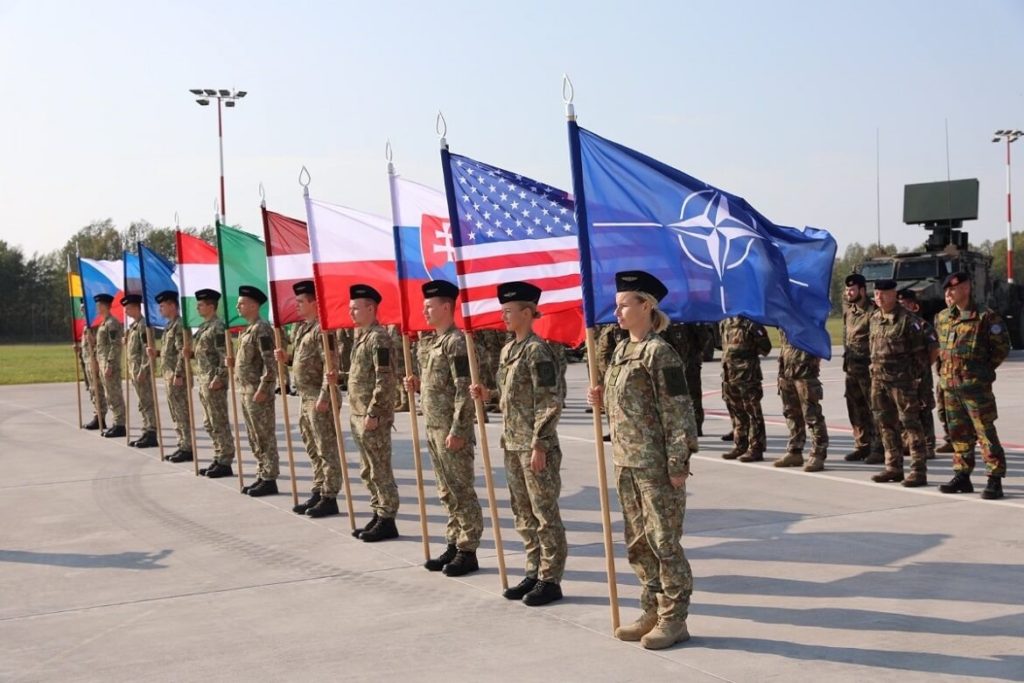World Geostrategic Insights interview with Beatrice Heuser on the characteristics of the Russian-Ukrainian war and how this conflict might end, when a war is “Just”, whether the West should update its concepts of warfare in the face of the challenges of a new world order, and whether the goal of a world without war can be achieved.

Prof. Beatrice Heuser is an historian and political scientist who holds the Chair of International Relations at the University of Glasgow. She has also taught at King’s College London in the Department of War Studies, at the University of Reading, and has taught or held visiting professorships at the Universities of Reims and Potsdam, Sciences Po’ Paris and Reims, the University of Rome III, the Bundeswehr University and the MGIMO University. She spent a year at NATO Headquarters as a Consultant/Intern, and has worked as Director of Studies of the German Bundeswehr’s military history research office. She is the author of many books, including WAR: A genealogy of Western ideas and practices (2022), Strategy before Clausewitz (2017), The Evolution of Strategy (2010), Reading Clausewitz (2002).
Q1 – Your latest book, “War: A Genealogy of Western Ideas and Practices”, published by Oxford University Press in March 2022, is an impressive work on the concepts and history of warfare as it has been theorized and practiced by the Western world from antiquity to the present. Evaluating sources from Vegetius to contemporary America, and focusing on strategy since the Napoleonic Wars, you explore in detail the evolution of strategic thinking, the social institutions, norms and patterns of behavior in which it operates, the policies that guide it, and the cultures that influence it. Has the outbreak of war in Europe last year, with the Russian invasion of Ukraine, led, or could it lead, to a significant change in Western concepts of warfare? Is Russia’s current military strategy rooted in the historical West’s thinking? Or in Putin’s mind? Could the conflict in Ukraine be seen as an old-style invasion war by one state against another, with its corollaries, such as massacres of civilians, sieges, and other cruelties, as there have been so many in European history? Or does it present different new characteristics that could foreshadow dangerous prospects for the European continent?
 A1 – The Russian invasion of Ukraine is a very classical war. What it has done is it has thrown Europeans back to an age which after the Second World War seemed to belong to the past. European integration which started with the Brussels Pact of mutual defense of 1948 aligned democratic states that on the whole upheld domestic and international law in their intention to put inter-state wars in Europe behind them, and to defend against external aggression. There were exceptions – attempts to reconquer or hold colonies, or by force to assert the control of the Suez Canal against Egyptian appropriation were not quite so easy to reconcile with the rejection of war as an instrument of state policy, but these cases were a little more ambiguous than the Russian all-out attack on Ukraine, much more reminiscent of Hitler’s attack on Czechoslovakia in early 1939 or the joint Soviet-German attack on Poland later that year. It is thus a return to a bleak past, but then, history does not evolve in a linear fashion, from chaos to order, from wars to peace. Order has given way many times to chaos, also in European history.
A1 – The Russian invasion of Ukraine is a very classical war. What it has done is it has thrown Europeans back to an age which after the Second World War seemed to belong to the past. European integration which started with the Brussels Pact of mutual defense of 1948 aligned democratic states that on the whole upheld domestic and international law in their intention to put inter-state wars in Europe behind them, and to defend against external aggression. There were exceptions – attempts to reconquer or hold colonies, or by force to assert the control of the Suez Canal against Egyptian appropriation were not quite so easy to reconcile with the rejection of war as an instrument of state policy, but these cases were a little more ambiguous than the Russian all-out attack on Ukraine, much more reminiscent of Hitler’s attack on Czechoslovakia in early 1939 or the joint Soviet-German attack on Poland later that year. It is thus a return to a bleak past, but then, history does not evolve in a linear fashion, from chaos to order, from wars to peace. Order has given way many times to chaos, also in European history.
Q2 – Typically, wars in Europe ended either with a severe defeat and unconditional surrender by one of the belligerent parties, or with a diplomatic compromise in which the warring sides agreed to mutual concessions. In either case, war was often followed by shifts in territorial boundaries. Returning to the war in Ukraine, how do you think this conflict might end, given also the difficulty of the two sides in making decisive strategic gains on the ground and the reluctance of Western countries to commit their militaries to the battlefield?
A2 – Actually, unconditional surrender was not the norm for many centuries. We know it from Antiquity, but later peace agreements tended to be characterized by some degree of concessions on both sides. Unconditional surrender came back with the American Civil War, and then was adopted as a war aim by the allied side in the two world wars. Purely hypothetically, four ways of ending the war in Ukraine are imaginable. On the extreme ends, Russia could still conquer all of Ukraine, unlikely given Western support to Kyiv, or Russia could be defeated and made to withdraw from all areas it has hitherto conquered, also unlikely.
Not only unlikely, but it is difficult to imagine that Clausewitz’s dictum would not apply that ” In war the result is never final. even the ultimate outcome of a war is not always to be final. The defeated state often considers the outcome merely as a transitory evil, for which a remedy may still be found in political conditions at some later date.” (On War, I, 1 para 9). The likelihood would be great that Russia would try again to attack Ukraine in a few years’ time. That could also be the longer-term result of a putative outcome No. 3, where Russia only gets to keep the lands it currently holds. A fourth outcome might be one where Ukraine commits to staying out of NATO, guaranteed by America and Russia, which is what Russia proposed to NATO on 17 December 2021 in what we now know amounted to an ultimatum. But even in such a scenario, Russia would be unlikely to give up the currently occupied areas. None of these outcomes would bode well for the future.
Q3 – The strategic culture of the United States, the leading Western power is strongly characterized by ideologies, values and moralism. U.S. strategy is built around the concept of Manifest Destiny, which justifies an expansionist policy as a mission to defend moral values, democracy and human rights: a noble cause legitimizes the use of violent means. This leads to the principle of “Just war,” governed by moral and legal principles considered universally just. Within this framework, the use of military force should be defensive, or aimed at preventing an enemy state or organization from doing harm, and it should lead to peace. What is your opinion? When is a war justifiable? Can military interventions by the United States and Western allies in recent decades, such as in Iraq, Afghanistan, Libya, etc., which have had as “collateral damage” the death and suffering of thousands of civilians, and as a result a chronic political instability in the countries affected, be considered just wars?
A3 – Libraries have been written about the Just War Tradition. Some form of it existed also in many parts of the world, not just in Europe, and it long predated Christianity. It was at least a norm to be acknowledged until the wars of Napoleon. After that it was temporarily eclipsed by 19th and early 20th century nationalism and sovereigntism, a view held even in international law that any sovereign state could pursue its raison d’état, its national interest, with the use of force. It was rediscovered even by strategists in the time between the two world wars, and captured in the Briand-Kellogg Pact of 1928 which outlawed war in pursuit of purely national interests. This and universal human rights are the two main pillars of the rules-based international system.
Even though this Briand-Kellogg Pact was co-negotiated by US Secretary of State Frank Kellogg, one strong American tradition has never let go entirely of the view that at least the USA with the Manifest Destiny you mentioned was above international law, if its national interests justified breaking international law. And now many countries seem to be returning to 19th-century thinking, claiming the right to do what they want because they can, and because they see it to be in their national interest. But the main problem with the Just War Tradition is that in describing conditions in which war can be waged, it supposes that in these conditions, war may be the lesser evil, compared with tolerating a greater evil such as genocide, or in suffering occupation and tyranny. It supposes that we can tell in advance which the lesser evil will be. But we cannot be entirely sure, as we cannot fully foresee second and third order consequences of war.
Q4 – The world hegemony of the United States, and the West in general, is increasingly challenged by China and, to a lesser extent, other countries, such as Russia, which adopt an authoritarian model of governance and do not necessarily recognize the values promoted by the West as binding in international relations. The world order of the coming decades is not likely to be what we are used to. Could this overturn the basic principles of warfare, paving the way for future wars? Should the West in this new scenario update its concepts of warfare?
A4 – You mean, should the West return to earlier concepts of warfare, do we need to rearm and prepare for war as should have happened in the democracies in the 1930s? There are indeed analogies: in the 1920s and 1930s, Britain, and to a lesser degree France, Belgium, the Netherlands, the Scandinavian countries, even the East European countries were in denial – they did not want war, they hoped Hitler would calm down and become a “normal” politician, they hoped his speeches were just hot air. I confess that I was similarly in denial about Putin’s Russia in 2008 when Russia went to war with Georgia, and thought after 2014 that we could still come to some understanding while upholding International Law.
The big difference is that today, the USA and Russia and China have nuclear weapons, which should at least in theory keep the lid on wars involving them. But perhaps we have become too convinced of this and too complacent. In the 1930s, there were strategists who thought that the possession of a bomber fleet alone would deter attacks on their countries. The German Minister of Defence, Boris Pistorius, has just said that Germany must again become “kriegstuechtig”, and he elaborated that this means being able to fight a defensive war. But last winter the Germans seemed unwilling even to turn down the heating if necessary to sustain solidarity with Ukraine and boycott Russian oil and gas imports. I don’t see a martial culture as positive in itself, but we in Europe have become used to peace and prosperity to a degree unprecedented in history.
On China, I do not see it as a military threat. The problem with China’s growing economic and financial influence the world over is that it could begin to impose Chinese social, political and cultural values on other parts of the world through the leverage its economic might gives it. This could happen very slowly, incrementally, and we might not notice it ourselves until it is too late to marshal our values and arguments to resist this in defense of our own values of free speech, individual human rights, and so on. Yes, this is a danger, but other than where the future of Taiwan is concerned, I fear strategists in the USA are helping transform a cultural and ideational challenge into a military confrontation which it does not have to become.
Q5 – According to the realist school, war has always existed and will always be with us, it is as old as humanity and has somehow been embedded in our DNA. In contrast, you stated, “I have been studying aspects of war and strategy-especially at the political-military interface level-for the last forty years of my life…. I have been studying aspects of war, a bit like an oncologist studies cancer, in the hope that a better understanding will eventually help us banish it in practice (and not just in theory).” Do you think it is really possible to achieve the goal of a world without wars?
A5 – At the moment a world without wars seems more remote than it did twenty years ago. But first of all, in the 200,000-300,000 years of human existence, we only have firm evidence of wars for the last 10,000 or so years, which is a very short part. Then, for centuries, people would have been incredulous if you had told them that one day, they could more-less rely on a thing called the State to hunt down thieves and murderers and bring them to justice, and that they need not carry weapons when going outside. Of course, theft and murder still occurs, as does vandalism and rape and all sorts of terrible things, even in Europe.
We have not eliminated crime altogether. Yet we see it as exceptional, and in Europe at least, normal people do not carry knives let alone firearms, they do not expect to have to defend themselves. They may not leave the doors of their houses or cars unlocked, but they would normally expect to find their car where they left it unless they parked it on a double yellow line… Violence will not disappear, nor will crime.
But war – in the sense of organized violent conflict carried out by substantial numbers of people – can become a very exceptional activity, hopefully, also in other parts of the world. One way this will be pushed further and further into the future is to say, ah, it will never happen, let us forget about norms or the acquis of International Law, these are nothing but scraps of paper. We must at least keep the structures and laws in place that will make this development possible – sooner, I hope, rather than later.
Beatrice Heuser – Historian and political scientist, Chair of International Relations at the University of Glasgow.
Image Credit: Tobruq Legacy 20 Public Affairs Office







